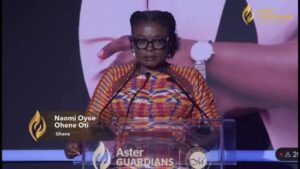A special highlight of the ceremony was a message from Dr. Tedros Adhanom Ghebreyesus, Director-General of the World Health Organization, who congratulated the finalists and commended Aster DM Healthcare’s commitment to championing the crucial contributions of nurses worldwide
- Nurse Naomi Ohene Oti from Ghana wins USD 250,000 at the award ceremony in Dubai, UAE selected from over 100,000 applications from nurses from 199 countries.
- His Excellency Sheikh Nahyan bin Mabarak Al Nahyan, Cabinet Member and Minister of Tolerance and Coexistence, UAE, presented the trophy to the winner.
 Nurse Naomi Oyoe Ohene Oti from Ghana, an Oncology Nurse Specialist & Head of Nursing, National Radiotherapy Oncology and Nuclear Medicine Centre, Korle-Bu Teaching Hospital, has been announced as the winner of the Aster Guardians Global Nursing Award 2025, receiving the prestigious USD 250,000 prize at a grand ceremony held in Dubai, UAE. The award was presented by His Excellency Sheikh Nahyan bin Mabarak Al Nahyan, Cabinet Member and Minister of Tolerance and Coexistence, UAE in the presence of Dr. Azad Moopen, Founder Chairman of Aster DM Healthcare (www.AsterDMHealthcare.com), alongside Alisha Moopen, Managing Director and Group CEO – Aster DM Healthcare, T.J. Wilson, Executive Director and Group Head – Governance & Corporate Affairs, Aster DM Healthcare, and other distinguished guests.
Nurse Naomi Oyoe Ohene Oti from Ghana, an Oncology Nurse Specialist & Head of Nursing, National Radiotherapy Oncology and Nuclear Medicine Centre, Korle-Bu Teaching Hospital, has been announced as the winner of the Aster Guardians Global Nursing Award 2025, receiving the prestigious USD 250,000 prize at a grand ceremony held in Dubai, UAE. The award was presented by His Excellency Sheikh Nahyan bin Mabarak Al Nahyan, Cabinet Member and Minister of Tolerance and Coexistence, UAE in the presence of Dr. Azad Moopen, Founder Chairman of Aster DM Healthcare (www.AsterDMHealthcare.com), alongside Alisha Moopen, Managing Director and Group CEO – Aster DM Healthcare, T.J. Wilson, Executive Director and Group Head – Governance & Corporate Affairs, Aster DM Healthcare, and other distinguished guests.
Launched in 2021 by Aster DM Healthcare, Aster Guardians Global Nursing Award aims to recognize and celebrate the extraordinary contributions of nurses across the world in various fields such as leadership, research, innovation and community service. The fourth edition of the award received an astounding participation with 100,000 application from nurses from 199 countries across the world – marking 28% growth in applications received in 2024.
A special highlight of the ceremony was a message from Dr. Tedros Adhanom Ghebreyesus, Director-General of the World Health Organization, who congratulated the finalists and commended Aster DM Healthcare’s commitment to championing the crucial contributions of nurses worldwide.
His Excellency Sheikh Nahyan bin Mabarak Al Nahyan, Minister of Tolerance and Coexistence, UAE said,
“The Aster Guardians Global Nursing Award stands as a distinguished platform that honors one of the noblest and most impactful professions in human history—nursing. Nurses are truly the first line of defense in any healthcare system. They provide care, comfort, and hope in the most critical moments and embody the highest ideals of humanity through their compassion and selfless service.
In the United Arab Emirates, we view the nursing profession with deep pride and gratitude, recognizing the tireless efforts and dedication of those who serve in this essential field. The late founding father of our nation, Sheikh Zayed bin Sultan Al Nahyan—may his soul rest in peace—envisioned a healthcare system built on the foundation of human dignity, where every healthcare worker is valued and supported. Today, this vision continues under the wise and inspiring leadership of His Highness Sheikh Mohamed bin Zayed Al Nahyan, President of the UAE, who firmly believes that investing in healthcare professionals is an investment in the nation’s future and the well-being of all people.
This award will help amplify our impact – scaling training, building faculty, and inspiring the next generation of oncology nurses across Africa
On this occasion, we extend our heartfelt congratulations to the winner of the Aster Guardians Global Nursing Award 2025, as well as to all the outstanding finalists. Each of them represents a beacon of compassion, resilience, and service to humanity. Their recognition is a testament to the profound impact nurses have on individuals and communities across the globe.
We reaffirm the UAE’s unwavering commitment to elevating the status of the nursing profession worldwide and honoring those who protect lives and care for others with devotion and dignity. This award reflects the spirit of tolerance, solidarity, and human fraternity that lies at the core of our national values.”
Commenting on the win, Nurse Naomi Ohene Oti said,
“To be honoured with the Aster Guardians Global Nursing Award is deeply humbling. This recognition is not mine alone – it belongs to every nurse across Ghana, Africa, and the world who leads with resilience, compassion, and courage. For over two decades, I have witnessed the inequities in cancer care firsthand and dedicated myself to closing these gaps through training, outreach, and system-level change. This award will help amplify our impact – scaling training, building faculty, and inspiring the next generation of oncology nurses across Africa. At the heart of my journey is a simple truth: nursing is not just a profession – it is a force for social justice, equity, and hope. Today, I stand not just for myself, but for every African nurse who dares to innovate and serve, even against the odds.”
Naomi Ohene Oti from Ghana is an Oncology Nurse Specialist & Head of Nursing, National Radiotherapy Oncology and Nuclear Medicine Centre at the Korle-Bu Teaching Hospital – where she has transformed patient care, pioneered specialist nurse training, and championed equity in cancer outcomes. She has been instrumental in developing and launching oncology nursing training programs in partnership with international centres like the Cross Cancer Institute in Canada, bringing world-class cancer education to local nurses in Ghana and significantly improving patient outcomes. In 2015, she was part of an expert team that developed the country’s postgraduate oncology nursing curriculum, and under her leadership, over 60 oncology nurse specialists and 10 breast care nurses have been trained, greatly expanding specialized care services nationwide.
Her influence extends across the continent. She is a member of education and training committee for the African Organisation for Research and Training in Cancer (AORTIC), and co-investigator on Global Bridges Oncology GM Grant. She has also co-led initiatives with ISNCC and shaped continental competencies and policies in cancer nursing, while mentoring more than 48 nurses from African nations. Through her role as a global faculty member with ASCO’s Multidisciplinary Cancer Management Courses, she brings African nursing perspectives to international cancer forums, advocating for culturally relevant care. She has received numerous national honors, including Ghana’s Ministry of Health Excellence Award and the prestigious Dr. Dorcia Kisseh International Award from the Ghana Registered Nurses and Midwives Association.
Dr. Azad Moopen, Founder Chairman, Aster DM Healthcare said, “Nurse Naomi Ohene Oti has redefined what it means to be a nurse – not just as a caregiver but as an innovator, leader, and changemaker. Her contributions uplift not only patients but the entire healthcare ecosystem, setting a gold standard for others to follow.
Each of the Top 10 finalists have demonstrated extraordinary dedication, skill, and compassion in their work. These nurses are not just healthcare providers, but true leaders, pushing boundaries and making a profound impact in their communities. Their exceptional contributions deserve to be recognized, and through this award, we celebrate their passion and commitment to improving lives across the globe.”
Ms. Alisha Moopen, Managing Director & Group CEO, Aster DM Healthcare said, “Naomi Ohene Oti’s story is a powerful reminder of the quiet heroism that unfolds every day in hospitals, clinics, and communities across the world. We are incredibly proud to shine a global spotlight on her work, and through her, honour the millions of nurses who keep healthcare systems running and humanity thriving.”
The rest of the 9 finalists, Catherine (Kate) Maree Holliday from Switzerland, Edith Namba from Papua New Guinea, Fitz Gerald Dalina Camacho from UAE, Dr. Jed Ray Gengoba Montayre from Hong Kong SAR, Dr. Jose Arnold Tariga from USA, Khadija Mohamed Juma from Kenya, Maheswari Jaganathan from Malaysia, Dr. Sukhpal Kaur from India, and Vibhaben Gunvantbhai Salaliya from India were also recognized for their contribution to nursing.
These nurses were selected through a stringent review process run by Ernst & Young LLP, a panel of Screening-Jury and the Grand Jury.







OTHER ARTICLES
Editorial — Prevent, inform, and act for women’s health in Africa
Kenya : Government Prioritises Maternal Health and Strengthens Support for Community Health Promoters
Strengthening pandemic prevention, preparedness, and response capacities in Senegal using the “One Health” approach